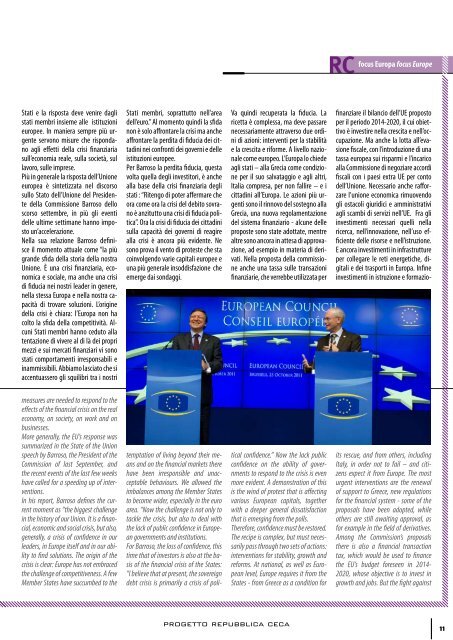Download PDF File - Gruppoibc.Eu
Download PDF File - Gruppoibc.Eu
Download PDF File - Gruppoibc.Eu
You also want an ePaper? Increase the reach of your titles
YUMPU automatically turns print PDFs into web optimized ePapers that Google loves.
Stati e la risposta deve venire dagli<br />
stati membri insieme alle istituzioni<br />
europee. In maniera sempre più ur‑<br />
gente servono misure che risponda‑<br />
no agli effetti della crisi finanziaria<br />
sull’economia reale, sulla società, sul<br />
lavoro, sulle imprese.<br />
Più in generale la risposta dell’Unione<br />
europea è sintetizzata nel discorso<br />
sullo Stato dell’Unione del Presiden‑<br />
te della Commissione Barroso dello<br />
scorso settembre, in più gli eventi<br />
delle ultime settimane hanno impo‑<br />
sto un’accelerazione.<br />
Nella sua relazione Barroso defini‑<br />
sce il momento attuale come “la più<br />
grande sfida della storia della nostra<br />
Unione. È una crisi finanziaria, eco‑<br />
nomica e sociale, ma anche una crisi<br />
di fiducia nei nostri leader in genere,<br />
nella stessa <strong>Eu</strong>ropa e nella nostra ca‑<br />
pacità di trovare soluzioni. L’origine<br />
della crisi è chiara: l’<strong>Eu</strong>ropa non ha<br />
colto la sfida della competitività. Al‑<br />
cuni Stati membri hanno ceduto alla<br />
tentazione di vivere al di là dei propri<br />
mezzi e sui mercati finanziari vi sono<br />
stati comportamenti irresponsabili e<br />
inammissibili. Abbiamo lasciato che si<br />
accentuassero gli squilibri tra i nostri<br />
measures are needed to respond to the<br />
effects of the financial crisis on the real<br />
economy, on society, on work and on<br />
businesses.<br />
More generally, the EU’s response was<br />
summarized in the State of the Union<br />
speech by Barroso, the President of the<br />
Commission of last September, and<br />
the recent events of the last few weeks<br />
have called for a speeding up of interventions.<br />
In his report, Barroso defines the current<br />
moment as “the biggest challenge<br />
in the history of our Union. It is a financial,<br />
economic and social crisis, but also,<br />
generally, a crisis of confidence in our<br />
leaders, in <strong>Eu</strong>rope itself and in our ability<br />
to find solutions. The origin of the<br />
crisis is clear: <strong>Eu</strong>rope has not embraced<br />
the challenge of competitiveness. A few<br />
Member States have succumbed to the<br />
Stati membri, soprattutto nell’area<br />
dell’euro.” Al momento quindi la sfida<br />
non è solo affrontare la crisi ma anche<br />
affrontare la perdita di fiducia dei cit‑<br />
tadini nei confronti dei governi e delle<br />
istituzioni europee.<br />
Per Barroso la perdita fiducia, questa<br />
volta quella degli investitori, è anche<br />
alla base della crisi finanziaria degli<br />
stati : “Ritengo di poter affermare che<br />
ora come ora la crisi del debito sovra‑<br />
no è anzitutto una crisi di fiducia poli‑<br />
tica”. Ora la crisi di fiducia dei cittadini<br />
sulla capacità dei governi di reagire<br />
alla crisi è ancora più evidente. Ne<br />
sono prova il vento di proteste che sta<br />
coinvolgendo varie capitali europee e<br />
una più generale insoddisfazione che<br />
emerge dai sondaggi.<br />
temptation of living beyond their means<br />
and on the financial markets there<br />
have been irresponsible and unacceptable<br />
behaviours. We allowed the<br />
imbalances among the Member States<br />
to become wider, especially in the euro<br />
area. “Now the challenge is not only to<br />
tackle the crisis, but also to deal with<br />
the lack of public confidence in <strong>Eu</strong>ropean<br />
governments and institutions.<br />
For Barroso, the loss of confidence, this<br />
time that of investors is also at the basis<br />
of the financial crisis of the States:<br />
“I believe that at present, the sovereign<br />
debt crisis is primarily a crisis of poli-<br />
Va quindi recuperata la fiducia. La<br />
ricetta è complessa, ma deve passare<br />
necessariamente attraverso due ordi‑<br />
ni di azioni: interventi per la stabilità<br />
e la crescita e riforme. A livello nazio‑<br />
nale come europeo. L’<strong>Eu</strong>ropa lo chiede<br />
agli stati – alla Grecia come condizio‑<br />
ne per il suo salvataggio e agli altri,<br />
Italia compresa, per non fallire – e i<br />
cittadini all’<strong>Eu</strong>ropa. Le azioni più ur‑<br />
genti sono il rinnovo del sostegno alla<br />
Grecia, una nuova regolamentazione<br />
del sistema finanziario ‑ alcune delle<br />
proposte sono state adottate, mentre<br />
altre sono ancora in attesa di approva‑<br />
zione, ad esempio in materia di deri‑<br />
vati. Nella proposta della commissio‑<br />
ne anche una tassa sulle transazioni<br />
finanziarie, che verrebbe utilizzata per<br />
tical confidence.” Now the lack public<br />
confidence on the ability of governments<br />
to respond to the crisis is even<br />
more evident. A demonstration of this<br />
is the wind of protest that is affecting<br />
various <strong>Eu</strong>ropean capitals, together<br />
with a deeper general dissatisfaction<br />
that is emerging from the polls.<br />
Therefore, confidence must be restored.<br />
The recipe is complex, but must necessarily<br />
pass through two sets of actions:<br />
interventions for stability, growth and<br />
reforms. At national, as well as <strong>Eu</strong>ropean<br />
level, <strong>Eu</strong>rope requires it from the<br />
States - from Greece as a condition for<br />
progetto repubblica ceca<br />
focus <strong>Eu</strong>ropa focus <strong>Eu</strong>rope<br />
finanziare il bilancio dell’UE proposto<br />
per il periodo 2014‑2020, il cui obiet‑<br />
tivo è investire nella crescita e nell’oc‑<br />
cupazione. Ma anche la lotta all’eva‑<br />
sione fiscale, con l’introduzione di una<br />
tassa europea sui risparmi e l’incarico<br />
alla Commissione di negoziare accordi<br />
fiscali con i paesi extra UE per conto<br />
dell’Unione. Necessario anche raffor‑<br />
zare l’unione economica rimuovendo<br />
gli ostacoli giuridici e amministrativi<br />
agli scambi di servizi nell’UE. Fra gli<br />
investimenti necessari quelli nella<br />
ricerca, nell’innovazione, nell’uso ef‑<br />
ficiente delle risorse e nell’istruzione.<br />
E ancora investimenti in infrastrutture<br />
per collegare le reti energetiche, di‑<br />
gitali e dei trasporti in <strong>Eu</strong>ropa. Infine<br />
investimenti in istruzione e formazio‑<br />
its rescue, and from others, including<br />
Italy, in order not to fail – and citizens<br />
expect it from <strong>Eu</strong>rope. The most<br />
urgent interventions are the renewal<br />
of support to Greece, new regulations<br />
for the financial system - some of the<br />
proposals have been adopted, while<br />
others are still awaiting approval, as<br />
for example in the field of derivatives.<br />
Among the Commission’s proposals<br />
there is also a financial transaction<br />
tax, which would be used to finance<br />
the EU’s budget foreseen in 2014-<br />
2020, whose objective is to invest in<br />
growth and jobs. But the fight against<br />
11



